
The Underrated Anthem of Existential Dread
There is a captivating dichotomy to the career of David Essex. On the one hand, he was the quintessential seventies teen idol—the handsome, working-class boy from East London whose every single sparked scenes of genuine hysteria. On the other, he was an artist of genuine depth, a songwriter and actor perpetually drawn to conceptual narratives and complex themes. It is in this latter, more reflective vein that we find the compelling, slightly brooding track, “Here It Comes Again.”
The song was a significant British chart success, a testament to his devoted following and his ability to evolve his sound. Released in the UK as a single in 1979 (the exact date is difficult to pin down, often listed towards the end of the year), “Here It Comes Again” climbed to a peak position of Number 14 on the Official UK Singles Chart. It was a standalone single that did not initially appear on a studio album, though it would later be included on several compilations, showcasing its enduring quality. At a time when disco and punk were fracturing the pop landscape, Essex demonstrated that sophisticated, slightly theatrical rock could still claim a place on the charts.
The story behind this particular song is less about personal biography and more about an emotional atmosphere. The lyrics capture a feeling familiar to every soul who has lived long enough to recognize the patterns of their own life: that moment of sinking dread when you realize a difficult, disruptive, or painful period is about to begin anew. It’s the cyclical nature of worry, the recurrence of old anxieties, or the return of relationship turbulence. The phrase “Here It Comes Again” isn’t a celebration; it’s a resigned sigh.
Musically, the song is a brilliant piece of melodic soft-rock that builds tension masterfully. It utilizes a prominent, slightly dramatic orchestral arrangement—a touch often characteristic of Essex’s work, blending his theatrical experience (fresh off his triumphant turn as Che in the original West End production of Evita, and before that, Godspell) with his pop sensibilities. The production is rich and layered, elevating the everyday anxiety in the lyrics to an almost epic, cinematic level. It possesses a grandeur that hints at the inner turmoil being described, making the listener feel the weight of that impending emotional return.
For those of us who remember the late seventies, this song is a potent memory, cutting through the fluff of typical pop to touch something real and internal. It wasn’t one of his two UK chart-toppers (Gonna Make You a Star or Hold Me Close), but its lasting resonance comes from its maturity. David Essex was not just singing about teenage love; he was tapping into a universal truth about the ebb and flow of fate, the awareness that no matter how good things are, the next challenge is always on the horizon. It’s a reflective piece, perfect for a moment of quiet contemplation, a reminder that the handsome rocker was also a sensitive philosopher of the human condition.